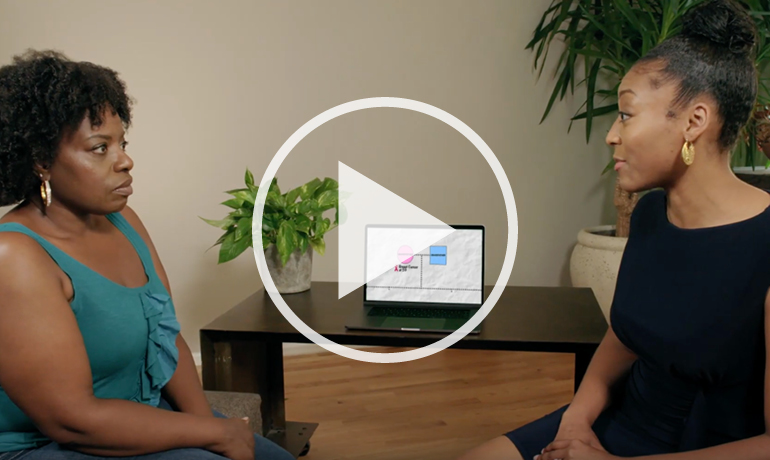
That’s a wrap.
The University of Illinois Cancer Center has finished production on a new six and one-half minute video to educate women – particularly of African American descent – on the importance of genetic counseling, which provides information to individuals on how hereditary conditions, such as cancer, might affect them or their family. Most importantly, the video is designed to motivate underserved minority women with a high-risk family history to attend genetic counseling in an effort to overcome racial disparities in the use of cancer genetic services.
A screenplay was developed by members of the GUIDE Project, led by Kent Hoskins, MD, UI Cancer Center member and associate professor of medicine in the Division of Hematology-Oncology, and director of the UIC Familial Breast Cancer Program, and Vida Henderson, PhD, PharmD, MPH, MFA, research scientist in the Office of Community Engaged Research and Implementation Science (OCERIS), and research assistant professor in the UIC School of Public Health, based on research with African American women at-risk for hereditary breast cancer. The women who participated in the study were all referred for genetic counseling in an earlier study conducted by Hoskins, but the majority of them did not attend the genetic counseling appointment.
In that study, which was part of the UIC Center for Population Health and Health Disparities funded by the National Cancer Institute, only 10 percent of high-risk minority women who were referred for genetic counseling attended a genetic counseling appointment. In-depth interviews with 20 women provided the basis for the film’s script, which was developed with input from Cancer Genetic Counselors Tara Maga, MS, PhD and Lara Balay, MS, from the Hereditary Cancer Clinic at UI Health. The script underwent extensive focus group testing with patients, providers from Mile Square Health Center, and several community stakeholder groups. Once the script was completed, actors were interviewed and locations for filming were scouted throughout Chicago neighborhoods.
Individuals may be reluctant to discuss genetic counseling due to the fear of the unknown. Taking this into account, the video, produced by Chicago’s SolidLine Media, was filmed in a relaxed setting – a backyard barbecue at a home in Rogers Park. Two women are renewing their friendship when a third, who clearly looks distraught, joins them. The friends perceive her stress and ask why she is sullen. She said her doctor had recently recommended genetic testing due to her family’s history of breast cancer. She told her friends she didn’t feel it was necessary.
“I know I’m probably going to get it (cancer) one day, so what’s the point?” the woman said. “I get my mammogram every year, so what else can I do?”
Another friend said her physician also recommended visiting a genetic counselor, and she was apprehensive at first because she was afraid to learn the results. She reluctantly went, and was glad she did, as the counselor put her fears to rest. The film’s narrator said the information gathered during the visit “will give you the power to make the best decisions for your health.
“Genetic testing doesn’t tell you that you have cancer, and it doesn’t tell you that you will get it one day. The information you get from genetic counseling will help you and your family better protect yourself from getting cancer,” the narrator said. Should the genetic counselor discover that a person has an increased chance of contracting breast cancer, it may be recommended that mammograms be undertaken at a younger age, or undergoing a breast MRI scan, where cancer can be detected even if an image is too small to show up on a mammogram.
With a central theme of the film being knowledge is power, individuals should plan for every contingency, especially when it comes to their health. During the barbecue, with all of the food and drinks lined up on picnic tables, a clear day suddenly turns cloudy, dropping rain on the partygoers. They rush to grab everything and scramble inside.
“Cancer’s like the weather,” the narrator says. “The chance of rain is higher on some days than others. All women have a chance of getting breast cancer, but some women’s chances are greater than others. Genetic counseling is like watching the weather report. You watch it so you make the best decisions for the future.
“If you have breast or ovarian cancer in your family, talk to your doctor and find out if genetic counseling can help you and the people you love to protect themselves. Or just call a genetic counselor. You don’t need a doctor’s order for a phone call. Don’t let cancer be the family secret.”
The film was funded in part by grant P20CA202908 (Dr. Robert Winn, Principal Investigator) from the National Institutes of Health/National Cancer Institute. Richard and Barbara Warnecke also lent their support to the project. Henderson and Hoskins were assisted on the film by several early career investigators at Governors State; Beverly Chukwudozie and Jennifer Newsome of the UI Cancer Center; UI Cancer Center member Angela Odoms-Young, PhD, associate professor of kinesiology and nutrition; and Ravneet Kaur.
The GUIDE Cancer Research Training Project is a collaborative initiative between Governors State and the UI Cancer Center. It will enhance the capacity of both institutions to conduct research to understand and reduce local cancer disparities and their determinants.
